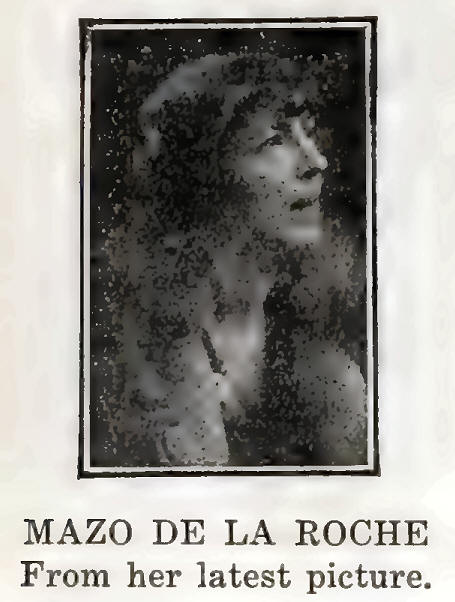|
PRIZE-WINNING had come
to be quite a habit with Mazo de la Roche even before her recent success
in carrying off the $10,000 prize for the best novel submitted in the
contest conducted by the Atlantic Monthly of Boston. The previous
awards, however, had been for one-act plays. There are various
estimates, all the way up to $50,000, as to the total amount accruing
from Jalna, and it is particularly pleasurable to be able to chronicle
the indubitable fact that in this ease the winner was a native-born
Canadian, Toronto being her birth-place. I do not know whether this
event has much significance for others, but I have, in recent years, run
into a lot of pooh-poohing of Canadian letters. If a writer, who had
come to Canada a babe in arms, grows up in thoroughly Canadian
surroundings and in due course achieves literary success, this author is
“after all not really a Canadian.” A prizewinning novel clearly inspired
by experiences of living in Western Canada cannot possibly be classed as
Canadian—the author is Norwegian, although she came to Canada at the age
of three—and so ad nauseam.
It was with Explorers of the Dawn that Miss De La Roche first came into
prominence and the fact that it had a foreword by Christopher Morley was
in itself a distinction. Her work had already been appearing in such
magazines as Harper’s and The Atlantic Monthly, and this book was marked
by the piquancy, fantastic coloring and clever characterization which
have accounted to so great an extent for her later successes.
The novels Possession and Delight gave promise of that greater
achievement now realized in Jalna, which will be taken to heart by
Canadians not only for its innate merits, but because of its
justification of Canada’s claim to a less cramped place in the literary
sun.
No estimate of this author’s work should fail to emphasize her
outstanding success with one-act plays. She has several of these to her
credit which are of a very high order, the best of them being Low Life,
which is a contribution of no mean significance to Canadian literature.
Ever since its first appearance it has taken a large place in the
activities of community theatres in different parts of Canada. T repeat
that this is an achievement of more than passing interest. It is a
forward step in a distinct branch of the development of Canadian
literature.
Retrospectively, the
work of Mazo De La Roche is an interesting subject for students of
Canadian literature, but it is the significance of the growth and
accomplishment revealed in what she has done that convinces one that her
star is in the ascendant and that there are still finer things to come
from this source.
Miss De La Roche is of French, Irish and English ancestry. The De La
Roches were a French Royalist family who fled to Ireland at the time of
the French Revolution.

Born in Toronto, she
attended public school and Parkdale Collegiate and subsequently the
University of Toronto. Later, with an ambition to become a
black-and-white illustrator, she took a course in the College of Art,
but the acceptance by Munsey’s Magazine a story about French Canada,
turned her attention to literature as a career, with the result so
eloquently attested by her experience with Jalna.
Miss De La Roche is a great lover of outdoor life, and her snug little
summer cottage near Clarkson, on the shore of Lake Ontario, is said to
be in the very locale of more than one of her novels.
Check-List of First Editions
Explorers of the Dawn. New York, 1922.
Possession. Toronto. 1923.
Delight. New York. 1926.
Low Life: A Play. Toronto. 1925.
Jalna.
New York. 1927.
Come True: A Play. Toronto. 1927. |
